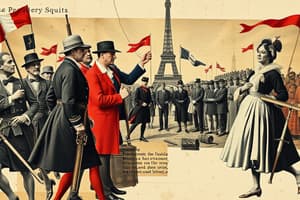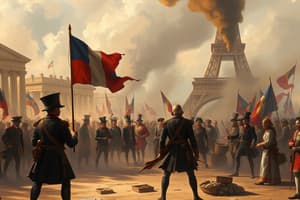Podcast
Questions and Answers
How did the U.S. gain access to the Mississippi River and the port of New Orleans?
How did the U.S. gain access to the Mississippi River and the port of New Orleans?
- The U.S. gained access through negotiations with Spain and France, leading to a peaceful transfer of ownership. (correct)
- The U.S. gained access through a military invasion and conquest of the territories.
- The U.S. purchased the territory from Spain in 1803.
- The U.S. received the territory as a gift from France in 1803.
How did the U.S. government deal with Native Americans as the nation expanded westward?
How did the U.S. government deal with Native Americans as the nation expanded westward?
The U.S. government dealt with Native Americans through treaties that often involved coercion and broken promises. They were forced to relocate from their lands to designated Indian Territory, leading to journeys like the Trail of Tears.
What was the primary cause of the First Two Party System?
What was the primary cause of the First Two Party System?
- Different views on the power of the federal government. (correct)
- The debate about the role of religion in government.
- The disagreement over the best economic policies to implement.
- The conflict between the North and South over slavery.
What was the purpose of President Washington's Farewell Address?
What was the purpose of President Washington's Farewell Address?
How did the Alien and Sedition Acts contribute to the political conflict over how to interpret the Constitution?
How did the Alien and Sedition Acts contribute to the political conflict over how to interpret the Constitution?
What were the similarities and differences between Shays' Rebellion and the Whiskey Rebellion?
What were the similarities and differences between Shays' Rebellion and the Whiskey Rebellion?
Flashcards
French Revolution and American Division
French Revolution and American Division
The French Revolution divided Americans along political lines, with Federalists being cautious and Anti-Federalists supporting the ideals of liberty and equality.
How did the U.S. get the Mississippi River and New Orleans?
How did the U.S. get the Mississippi River and New Orleans?
The U.S. gained access to the Mississippi River and the port of New Orleans through the Louisiana Purchase, buying it from France in 1803.
U.S. Government Policies on Native Americans
U.S. Government Policies on Native Americans
The U.S. government dealt with Native Americans through treaties and policies like the Indian Removal Act, which led to the forced relocation of Native Americans westward.
Shays' Rebellion vs. Whiskey Rebellion
Shays' Rebellion vs. Whiskey Rebellion
Signup and view all the flashcards
Cause of the First Two Party System
Cause of the First Two Party System
Signup and view all the flashcards
George Washington's Farewell Address
George Washington's Farewell Address
Signup and view all the flashcards
Alien and Sedition Acts: Controversy
Alien and Sedition Acts: Controversy
Signup and view all the flashcards
Alien and Sedition Acts: Impact on the Constitution
Alien and Sedition Acts: Impact on the Constitution
Signup and view all the flashcards
Alien and Sedition Acts: Federalist vs. Democratic-Republicans
Alien and Sedition Acts: Federalist vs. Democratic-Republicans
Signup and view all the flashcards
Study Notes
French Revolution's Impact on Americans
- Americans were divided along political lines
- Federalists viewed the revolution with suspicion due to its violence
- Anti-Federalists supported revolutionary ideals of liberty and equality, despite some actions taken by the revolutionaries
US Access to Mississippi River and New Orleans
- The U.S. gained access through the Louisiana Purchase in 1803
- Bought the territory from France, which had acquired it from Spain
US Government's Treatment of American Indians
- Government primarily used treaties to acquire land
- Often involved coercion and unkept promises
- Relocation of tribes was common, resulting in journeys like the Trail of Tears
Similarities and Differences Between Shays' and Whiskey Rebellions
- Both were protests against perceived unfair taxation by the government, mainly farmers
- Shays' Rebellion: local in Massachusetts, addressed by the state militia
- Whiskey Rebellion: federal tax, required national government intervention
Primary Cause of the First Two-Party System
- Differing views on the power of the federal government
- Federalists favored a strong central government
- Anti-Federalists (Democratic-Republicans) favored a weaker central government with more power to the states
President George Washington's Farewell Address
- Announced his decision not to seek a third term
- Set a precedent for future presidents
- Warned against political partisanship
- Emphasized national unity and advised the people on the nation's future
Alien and Sedition Acts' Impact on Political Conflict
- Debate on the limits of federal power arose
- Democratic-Republicans argued these acts violated rights.
- Federalists argued necessity to protect national security to justify these laws.
Studying That Suits You
Use AI to generate personalized quizzes and flashcards to suit your learning preferences.




